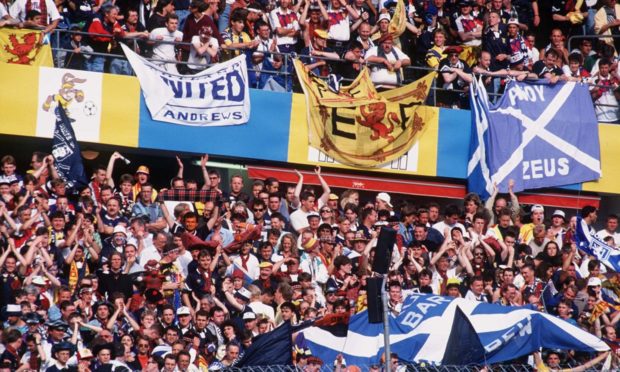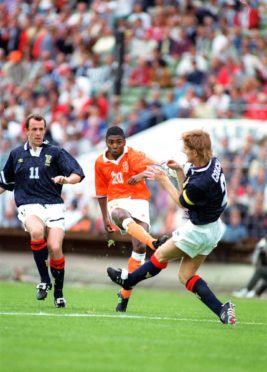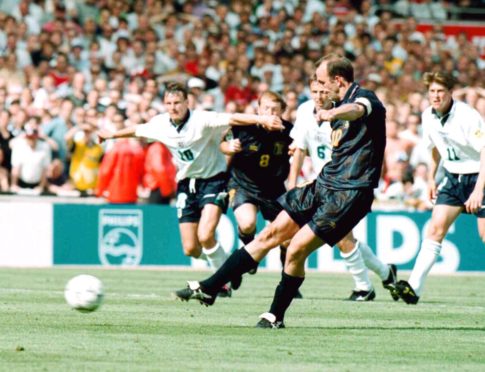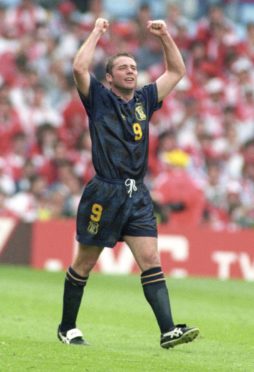The friendlies have been played, the final touches to the preparations are almost complete. Euro 2020, 12 months later than initially scheduled, is finally here.
For Scotland, given it has been 23 years since we last graced the finals of a major tournament, the tournament cannot come quick enough.
A whole new generation of Tartan Army members will follow every agonising kick of the ball, every mistake, every goal, every controversy, for the first time.
For some of the older fans who can remember seeing the national team on the big stage, it will be an equally emotional moment as those memories of days gone by come to the fore.
It was the World Cup in 1998 when Scotland last joined the party, but as far as the Euros are concerned this will be our third appearance.
But how did the previous two adventures go? Let’s take a trip down a memory lane:
Euro 1992
Ah, Sweden. Home of ABBA and for a few short weeks, thousands of Scots.
Andy Roxburgh has the distinction of being the first manager to lead Scotland to the finals of a European championship and you just had to look at the group to see how big an achievement it was.
Scotland were drawn in a group which included the Netherlands, who were the reigning champions, world champions Germany, who were playing as a reunified nation for the first time, and the Commonwealth of Independent States, the fancy name for the transitional team of the old Soviet Union, the team which the Dutch had beaten in West Germany to win the tournament in 1988.
Clearly much was changing in the world in 1992, with the other group in the eight-team tournament consisting of hosts Sweden, France, England and Denmark, who received a late invite after Yugoslavia were disqualified due to the Yugoslav wars.
It was not just the make-up of Europe which was fundamentally shifting, but the rules of the game too. This was the last major international tournament to consist of just eight countries and also the last to feature two points for a win and be staged before the back-pass rule was introduced.
Denmark, the late replacements, would stun the world by going all the way to win the tournament, beating the Germans in the final for their only major tournament success.
For Roxburgh’s Scotland, third place was where they would finish in Group 2.
The opening game took place in Gothenburg and the Scots went down 1-0 to a strong Dutch team with Dennis Bergkamp getting the only goal of the game.
The second match against eventual finalists Germany in Norrkoping ended in a 2-0 win for the world champions with goals either side of half-time from Karl-Heinz Riedle and Stefan Effenberg giving them a 2-0 win.
Scotland were left with nothing but pride to play for in the final game against the CIS, who had picked up two points following draws against the Dutch and the Germans.
Roxburgh’s side produced a terrific display to win 3-0 with Paul McStay and Brian McClair scoring in the opening 16 minutes to put the Scots in control before a late Gary McAllister penalty sealed a fine victory.
We headed home, but did so with pride after competing well against some big hitters in international football.
Euro 1996
England in 1996. Home of Baddiel and Skinner’s anthem Three Lions and the location of the European championship.
While the wait to see Scotland in the Euros had been a long one, the Tartan Army faithful were back on the big stage four years on from Euro 92. Little did they realise their exit from this tournament would be so cruel.
Scotland were under new management by this point, with Craig Brown now in charge, and were drawn once more with the Netherlands, Switzerland and hosts England for a tournament which had been extended to 16 teams.
The Dutch, once more, were first up, but – unlike Sweden in 1992 – Scotland were not beaten. It was not a thriller, but the goalless draw against one of the fancied nations represented a solid start for Brown’s men.
Then came England and a game which is as fresh in the memory today as it was back then.
Trailing to an Alan Shearer goal, Scotland had refused to give up at Wembley and when they were awarded a penalty the Tartan Army contingent were daring to dream of taking another point, but David Seaman saved Gary McAllister’s effort.
Seconds later, England had broken upfield and Paul Gascoigne, a darling of the Rangers support at this point, scored a spectacular second to secure a 2-0 win.
Despite the shattering nature of the loss, Scotland still had a chance of qualifying going into the final game against Switzerland at Villa Park.
The scenario was straightforward. Scotland had to beat the Swiss and hope the Auld Enemy did them a favour by beating the Netherlands.
Ally McCoist picked the perfect time to score his first goal in a major finals as he fired home a spectacular effort for the only goal of the game as all attention turned to Wembley.
With little more than an hour played, the seemingly unlikely scenario was possible as two goals from Shearer and Teddy Sheringham had put England 4-0 up.
For 16 minutes, we dared to believe qualification for the knockout stage was about to happen for the first time in the history of the national team, only for Patrick Kluivert to grab a consolation goal 12 minutes from time to leave the Scots crestfallen.
Now, 25 years later, Scotland are back. England at Wembley beckons once more, but the Czech Republic and Croatia group matches will be played at Hampden.
With home advantage for two crucial games, could this finally be Scotland’s time to shine?
A nation of fans, old and new, holds its breath.



